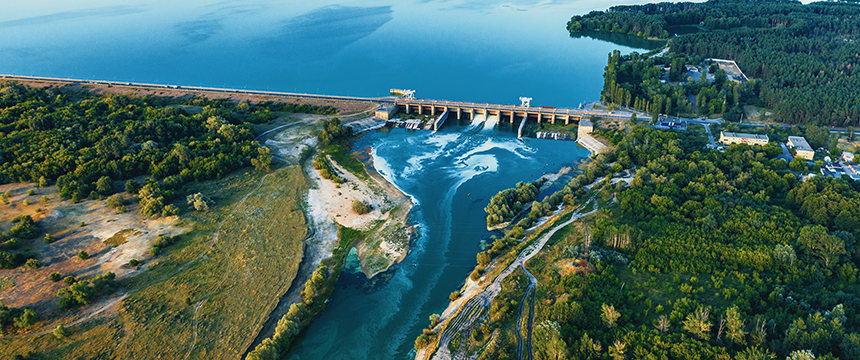Proyecto de ley para reformar la Ley de la Industria Eléctrica Mexicana presentado recientemente por el presidente López Obrador

El presidente Andrés Manuel López Obrador ha enviado a la Cámara de Diputados un proyecto de ley preferencial para reformar la Ley de la Industria Eléctrica, que el Congreso deberá debatir en los próximos 60 días.
Los temas principales del proyecto de ley incluyen:
Modificación de las normas de despacho
El proyecto de ley modificará las normas de despacho según las cuales la electricidad se suministrará al sistema eléctrico en el siguiente orden:
- “First – The hydroelectric power plants owned by the Mexican Federal Electricity Commission (CFE or Comisión Federal de Electricidad</em>);
- Segundo: las centrales nucleares, geotérmicas, de ciclo combinado y termoeléctricas propiedad de la CFE.
- Tercero: las centrales solares y eólicas propiedad de entidades privadas; y
- Cuarto: las centrales eléctricas de ciclo combinado propiedad de entidades privadas.
Cabe señalar que los regímenes de autoabastecimiento y cogeneración no se mencionan en estas nuevas normas de despacho. Sin embargo, entendemos que dichas centrales eléctricas se despacharán en tercer lugar, si se consideran renovables o de cogeneración eficiente; de lo contrario, se despacharán en cuarto lugar.
Cabe destacar también que el proyecto de ley introduce un nuevo tipo de contrato que los proveedores de servicios básicos de la CFE podrán firmar con CFE Generación. Este nuevo contrato no exigirá a los proveedores de servicios básicos de la CFE realizar subastas de energía para obtener electricidad y capacidad de generadores privados. Por lo tanto, todas las nuevas centrales eléctricas que construya la CFE ejecutarán estos nuevos acuerdos de compra de energía con compromiso de entrega física (PPA) con el proveedor de servicios básicos de la CFE sin necesidad de realizar una subasta de energía y, de conformidad con las nuevas normas de despacho, tendrán preferencia sobre las centrales eléctricas propiedad del sector privado.
Si se aprueba, las modificaciones del proyecto de ley podrían provocar esencialmente que: (i) el Gobierno mexicano deje de realizar subastas de energía para garantizar la capacidad y la electricidad del sector privado; por lo tanto, (ii) no se desarrollarán nuevos proyectos de energía renovable en los próximos años; (iii) México incumpla sus compromisos en virtud del Acuerdo de París y otros acuerdos internacionales de libre comercio suscritos por México con otras regiones o países económicos, incluidos, entre otros, el T-MEC; (iv) los proyectos de energía existentes se enfrenten a problemas de restricción que podrían poner en peligro su viabilidad financiera; y (v) los servicios de generación y comercialización de energía no se presten en condiciones de libre mercado, ya que el Operador Independiente del Sistema (ISO) daría prioridad a la generación de la CFE.
Nuevos permisos de generación de energía e interconexión
Según el proyecto de ley, la concesión de nuevos permisos de generación de energía estará sujeta a los criterios de planificación del Sistema Eléctrico Nacional emitidos por la Secretaría de Energía. El acceso a la red eléctrica no estará sujeto a las normas de acceso abierto, sino que se concederá si es técnicamente viable [un concepto que definirán el Centro Nacional de Control de Energía (CENACE), la ISO y la CFE como operador del Sistema Nacional de Transmisión].
Los nuevos proyectos de generación de energía de CFE tendrán prioridad de interconexión a la red eléctrica.
Certificados de energía limpia
El proyecto de ley establece que los Certificados de Energía Limpia (CEL) pueden concederse a las instalaciones de generación de energía limpia, independientemente de su titularidad y de la fecha en que la central eléctrica haya comenzado a funcionar. Esto significa que todas las centrales eléctricas de energía limpia de la CFE recibirán CEL.
Con este cambio, el mercado se verá inundado de CEL, lo que provocará una reducción de su precio y desalentará el desarrollo de nuevos proyectos de energía limpia.
Revocación de permisos de generación de energía por parte de la Comisión Reguladora de Energía (la CRE)
Con esta modificación, la CRE tendrá derecho a revocar los permisos de generación de energía (es decir, en el marco de los regímenes de autoabastecimiento y cogeneración) que obtuvieron los generadores de energía que crearon mercados de energía privados y separados, tal y como sostiene el proyecto de ley, en contra de la ley.
La administraciónLópez Obrador considera que los regímenes de autoabastecimiento y cogeneración introducidos en la Reforma Energética Mexicana de 1992 deben limitarse exclusivamente a las empresas que deseaban satisfacer su demanda de energía; el propósito de dicha reforma fue malinterpretado al permitir que los generadores de energía vendieran energía a sus diferentes «accionistas». Todos estos permisos pueden ahora ser revocados por la CRE.
Renegociación de los acuerdos de compra de energía (PPA) celebrados en el marco del programa de productores independientes de energía (IPP)
Con esta reforma, el poder ejecutivo revisará la «rentabilidad» de todos los acuerdos de compra de energía firmados con los productores independientes de energía (IPP).
Preocupaciones y conclusiones preliminares
Si el Congreso aprueba el proyecto de ley —lo cual creemos que ocurrirá, ya que el partido político del presidente, MORENA, cuenta con la mayoría necesaria para aprobarlo—, México enviará un mensaje desafortunado al sector privado de la industria eléctrica. Los inversores locales y extranjeros han invertido millones de dólares en el desarrollo de proyectos energéticos en el marco de la Reforma Energética Mexicana y este proyecto de ley cambiará las reglas por las que se realizaron dichas inversiones. Como resultado, es muy probable que se presenten reclamaciones en virtud de los diferentes tratados de inversión bilaterales o multilaterales firmados por México (es decir, el T-MEC, el Acuerdo Global UE-México, el TCPTT y otros).
Muchos de estos temas habían sido introducidos por el Gobierno mexicano en la Nueva Política de Fiabilidad del Sistema Eléctrico Nacional (la Política de Fiabilidad). La Política de Fiabilidad fue objeto de impugnaciones de constitucionalidad presentadas principalmente por la Autoridad Federal de Competencia Económica (Cofece) y el sector privado a través de diferentes procedimientos constitucionales (de amparo) en los tribunales federales de distrito. Como resultado de estos procedimientos, la Suprema Corte de Justicia de la Nación consideró inconstitucional la Política de Fiabilidad, suspendiendo los efectos de la misma, y diferentes tribunales federales han comenzado a dictar sentencias en contra de la política, resolviendo, entre otras cosas, que viola la libre competencia y proporciona una ventaja indebida a la CFE.
Las modificaciones propuestas pueden ir en contra de las disposiciones y principios antimonopolio previstos en la Constitución Política Mexicana y pueden dar lugar a un aumento de las tarifas eléctricas para los sectores comercial, industrial y doméstico.
Además, dar prioridad al despacho de las centrales eléctricas de la CFE, basadas en combustibles fósiles, y restringir la generación de energía a partir de fuentes renovables, pondrá en peligro el cumplimiento por parte de México de sus objetivos de Contribución Determinada a Nivel Nacional (NDC) para 2030 en virtud del Acuerdo de París, la Ley de Cambio Climático y la Ley de Transición Energética. Con esta política, México será el primer país del G20 en incumplir el Acuerdo de París.
Acciones legales contra el proyecto de ley una vez que se promulgue
Teniendo en cuenta que el proyecto de ley modifica las normas de despacho en virtud de las cuales se desarrollaron y financiaron los proyectos de generación de energía, y cuyas disposiciones pueden ser contrarias a las disposiciones antimonopolio y otras disposiciones reguladas por la Constitución Política de México, los participantes interesados de la industria pueden impugnar el proyecto de ley una vez promulgado en los tribunales mexicanos mediante un procedimiento constitucional (Amparo) y solicitar una medida cautelar, ya que los tribunales federales pueden suspender la aplicación del proyecto de ley.
Los inversionistas internacionales también pueden considerar el arbitraje internacional en virtud de los tratados bilaterales o multilaterales de inversión que México ha firmado, incluyendo, entre otros, el T-MEC.
Foley & Lardner LLP
Los abogados de Foley cuentan con una amplia experiencia en litigios relacionados con la energía, administrativos y constitucionales, tratados internacionales y arbitrajes, así como en litigios antimonopolio, para ayudar a los clientes a impugnar este proyecto de ley y proteger sus inversiones en México.


